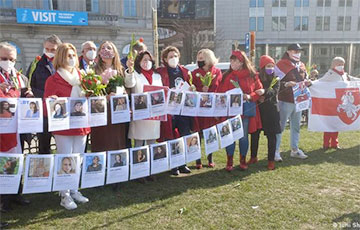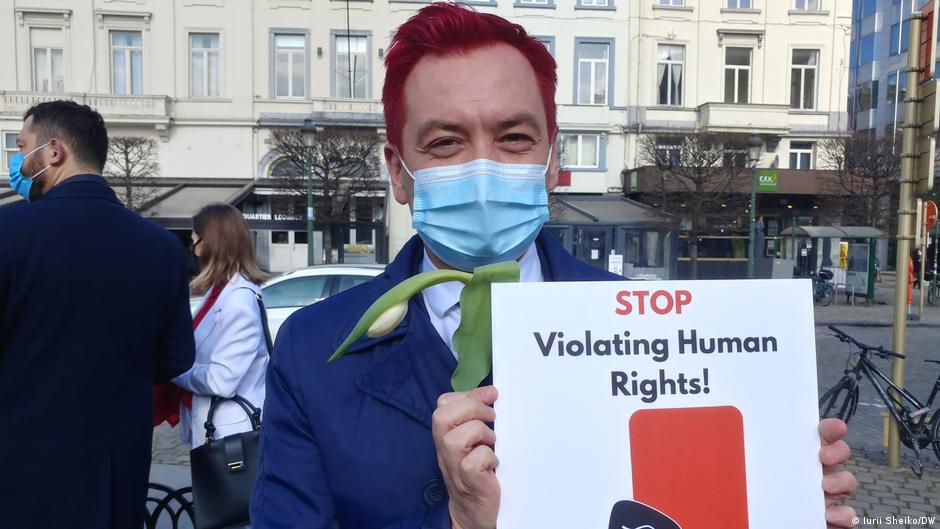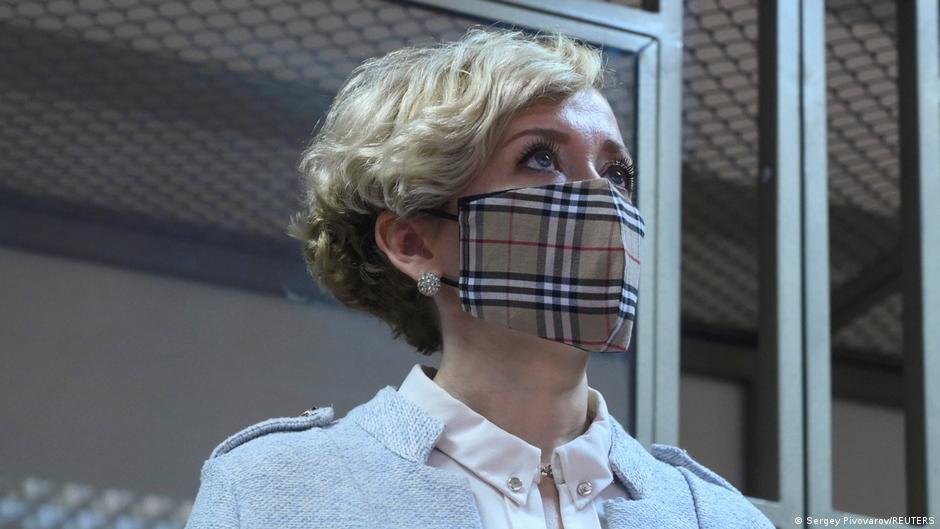How Belarusian Women Were Supported in Brussels
- 10.03.2021, 10:46

Several large-scale rallies took place at once on March 8.
Several rallies in support of women activists in Belarus and Russia were held in Brussels on March 8. DW report on what Brussels thinks about the "female face" of the protests and the situation in Belarus.
The 8 March holiday in Brussels turned out to be truly international this year. The point is not only that US Vice President Kamala Harris and New Zealand Prime Minister Jacinda Ardern made a video link at the opening of the plenary session of the European Parliament, but also the special attention paid to women in Belarus and Russia at several rallies in Brussels.
»March for Freedom in Belarus" in Brussels
At lunchtime, about 100 Belarusian activists from all over Belgium gathered in Luxemburg Square in front of the European Parliament. The demonstration "March for Freedom in Belarus" was held by the organization of Belarusians in Europe ABELE. They were joined by several MEPs: German Michael Gahler from the European People's Party (EPP), Social Democrats Pole Robert Biedron and Austrian Evelyn Regner, liberals Nicola Beer from Germany Petras Aushtrevičius from Lithuania,, and German Viola von Cramon from "green."
Activists and parliamentarians held portraits of women from Belarus recognized as political prisoners. These are Maryja Kalesnikava, who has become one of the symbols of protests in Belarus, 22-year-old Minsker Maryja Safonava, arrested for the inscription "Long live Belarus," 18-year-old Vitalia Bandarenka, accused of "participation in mass riots," and the program director of the Press Club Ala Sharko, who is charged with "tax evasion" on an especially large scale. In total, there are 269 people on the list of political prisoners of the Belarusian human rights center Viasna, 38 of them are women. In addition, 141 criminal cases were initiated against women on political grounds.
- Women are symbols and leaders of the protest in Belarus. Women's willpower, beauty, and kindness inspire people to fight for their rights. We wanted to show solidarity with those women, who, among other things, are now in prison. Their fates are very important to us. We must monitor them very closely and do everything for their release, - said DW representative of ABELE Daria Mustafayeva. - On International Women's Day, we must remember that human rights and women's rights must be respected everywhere."
"Revolution in Belarus - Women's Revolution»
Vice-Speaker of the European Parliament Nicola Beer expressed support for "every woman who opposes the dictatorship, whether in personal relationships or relations with illegally elected authorities, as in Belarus." The MEP stressed that she does not create an image of a victim from women, but "it is a fact, it is statistics that women are at risk of becoming a victim of sexual violence and abuse."
She called on other deputies to take care of political prisoners from Belarus. Ber herself took Anna Sungurova under her wing. On March 9, she intends to send a letter to the prosecutor in charge of the Minsk woman's case demanding the immediate release of the "illegally detained" Sungurova.

The demonstration was also joined by Polish activists who oppose the tightening of abortion legislation in the country. Pole Robert Biedron, who heads the European Parliament delegation for relations with Belarus, dyed his hair red by March 8 in solidarity with the protests in both countries. “The revolution in Belarus is a women's revolution. The pro-democratic revolution in Poland is a women's revolution. You will change the world!” he said.
The permanent rapporteur of the European Parliament for Belarus, Petras Aushtrevičius, expressed a wish that Biedron will not have to dye his hair on March 8 in the coming years. “I hope that next spring will be different, and we will celebrate it in Minsk in a completely different situation,” Austrevičius said. “In prisons in Belarus, there are many women, both young and older, who have not done anything, but only used their right to have a different point of view,” he added.
At about the same time, the persecution of journalists in Belarus was discussed at the Permanent Mission of Poland in Belarus. First of all, the matter concerned the employees of the Polish TV channel Belsat Katsiaryna Bakhvalava and Darja Chultsova, who were recently sentenced to two years of imprisonment.
Ambassador Andrzej Sados opens our event held on #InternationalWomensDay and dedicated to the repressions against female journalists in #Belarus.#EU27, 🇨🇦🇬🇧🇺🇸 & @EU_Commission representatives are discussing the situation on the ground with @Belsat_TV reporters and @ARomasze. pic.twitter.com/G6fiXMXzOy
— Poland in the EU (@PLPermRepEU) March 8, 2021
Russian and Belarusian activists in the European Parliament
In the evening, several MEPs held a virtual discussion within the Sakharov Prize community. They invited Tatyana Khomich, sister of last year's laureate Maryja Kalesnikava, and Stefania Kulaeva from Memorial, which was awarded the prize in 2009. Anastasia Shevchenko, who was the first in Russia to receive a sentence for participating in the activities of an "undesirable organization," also took part in it.

Deputy Speaker of the European Parliament Heidi Hautala from Finland was interested in whether it was possible to communicate with Kalesnikava. Khomich said that this is possible only through a lawyer. "This is her fifth defender," she said and recalled that Ludmila Kazak in February became another lawyer for Kalesnikava, whose license was taken away. Sometimes Tatstsiana Khomich receives letters from her sister, but with a two-week delay. "Our father, who lives in Belarus, tries to meet with her, but he is refused all the time; all these six months, he is not allowed to see Maryja," added Maryja Kalesnikava's sister.
She asked to write letters to political prisoners and support their families, for example, to buy a birthday present for their children. "Even one letter received by a political prisoner in the morning will make him happy for the whole day. This is a quote from one of the political prisoners, a friend of Maryja," Khomich said.
Anastasia Shevchenko spoke about two years spent under house arrest: “I could not go out for months. I could not call the doctor when my children or my mother were sick. I could not dispel my daughter's ashes. And a camera was installed in my bedroom, keeping an eye on me and my family long before my arrest." Shevchenko mentioned the persecution of many other activists, for example, Lyubov Sobol, Kira Yarmysh, Yulia Tsvetkova. “I ask myself all the time: why are the Russian authorities, judges, prosecutors, investigators so inhuman and cruel? I think that by making people suffer, they are showing their power,” Shevchenko said.
At this discussion, MEPs spoke little. But the representative of the Greens from Germany Sergey Lagodinsky said: “Why do we emphasize our solidarity on March 8? Not because we believe women are weaker, and that they need more support. But I think that our structures and the way we think make women more vulnerable."










